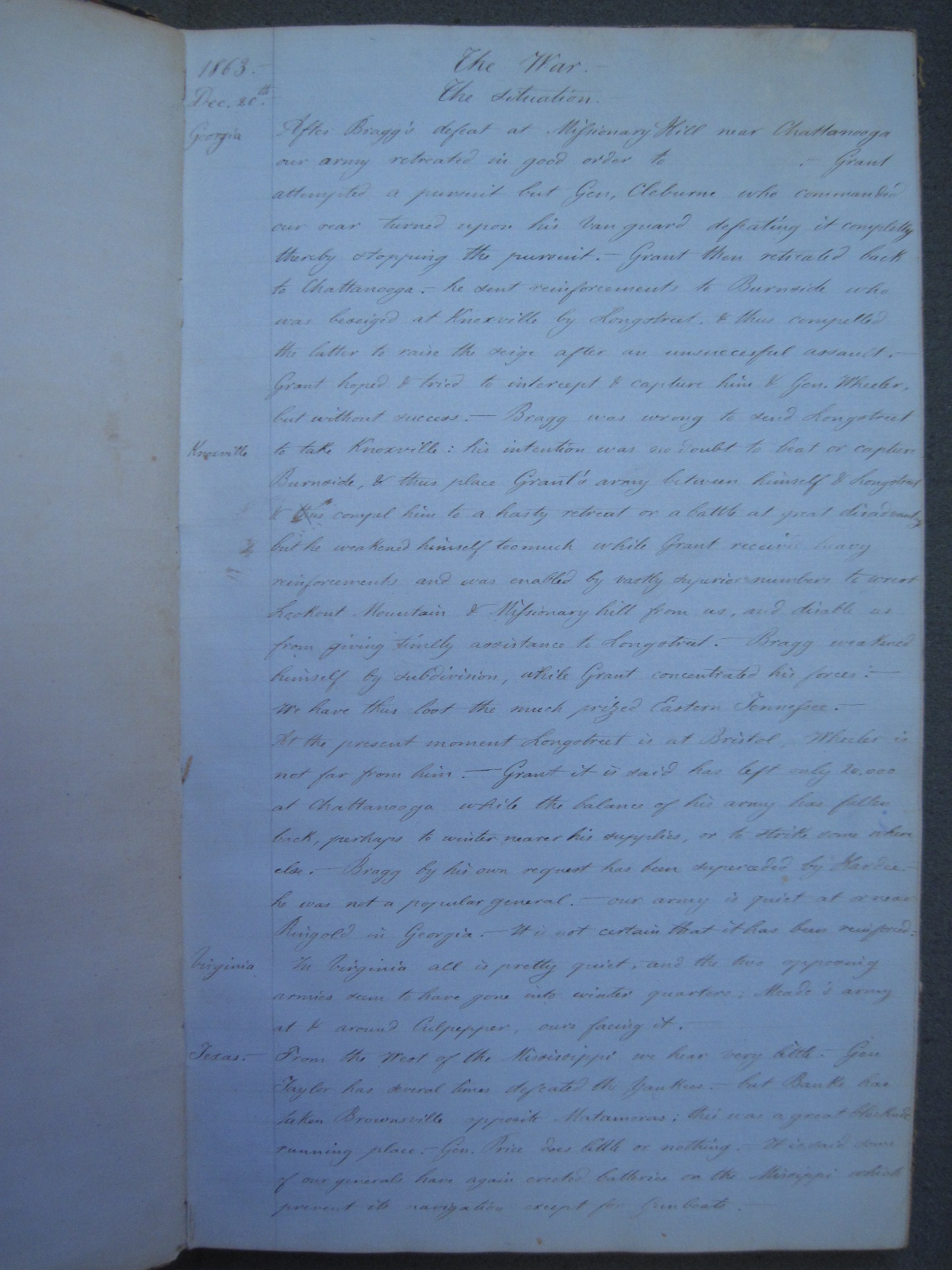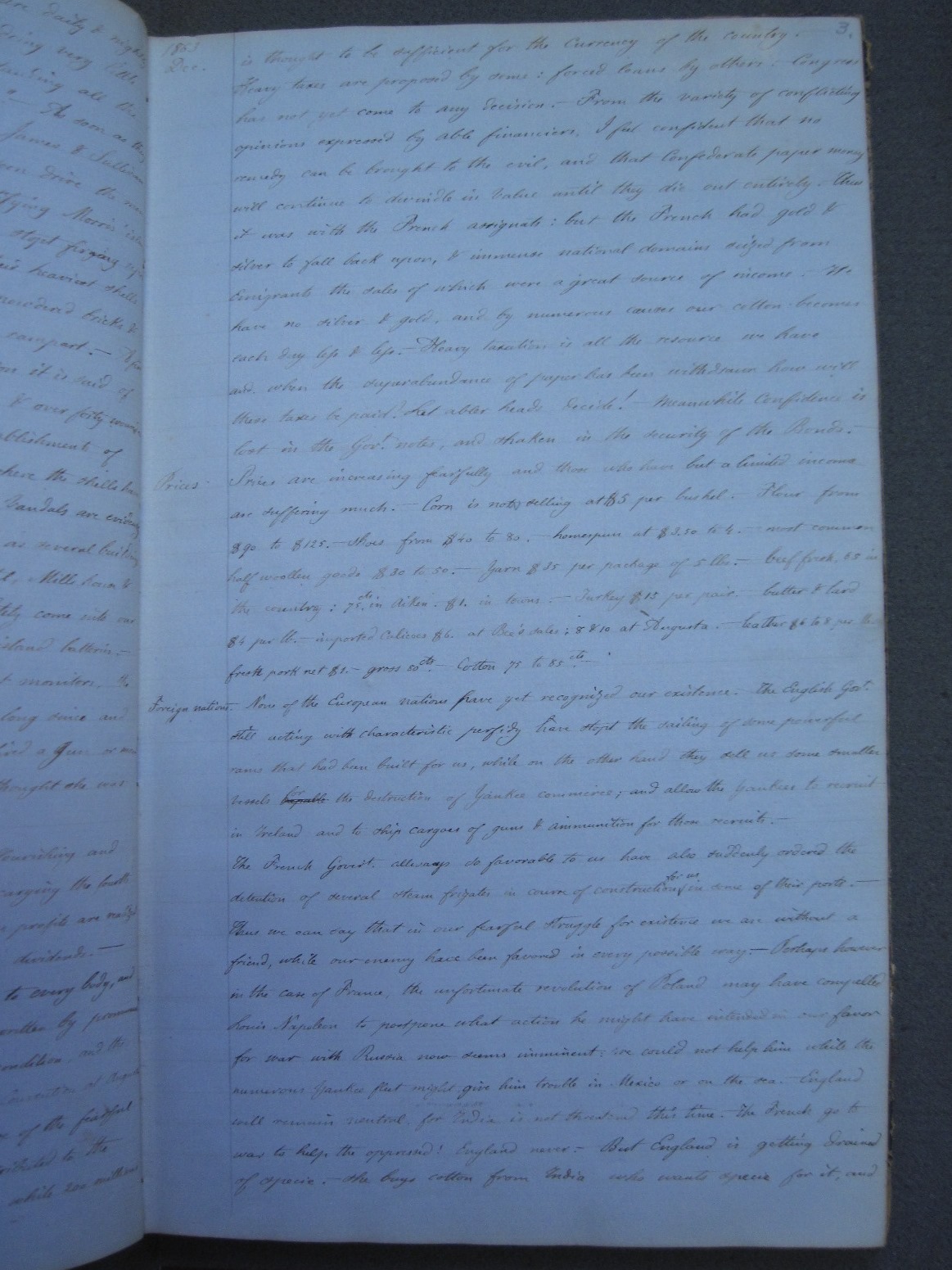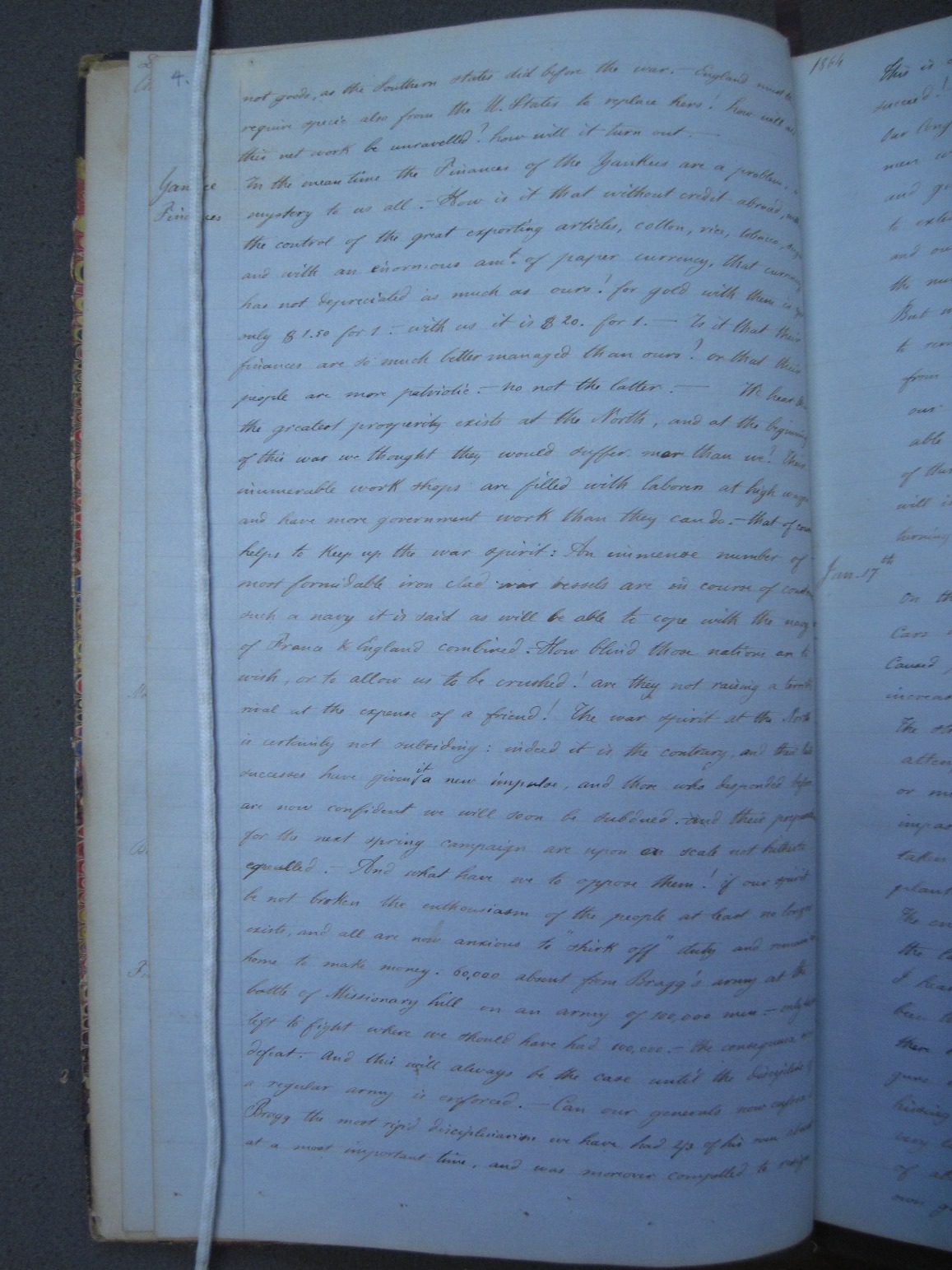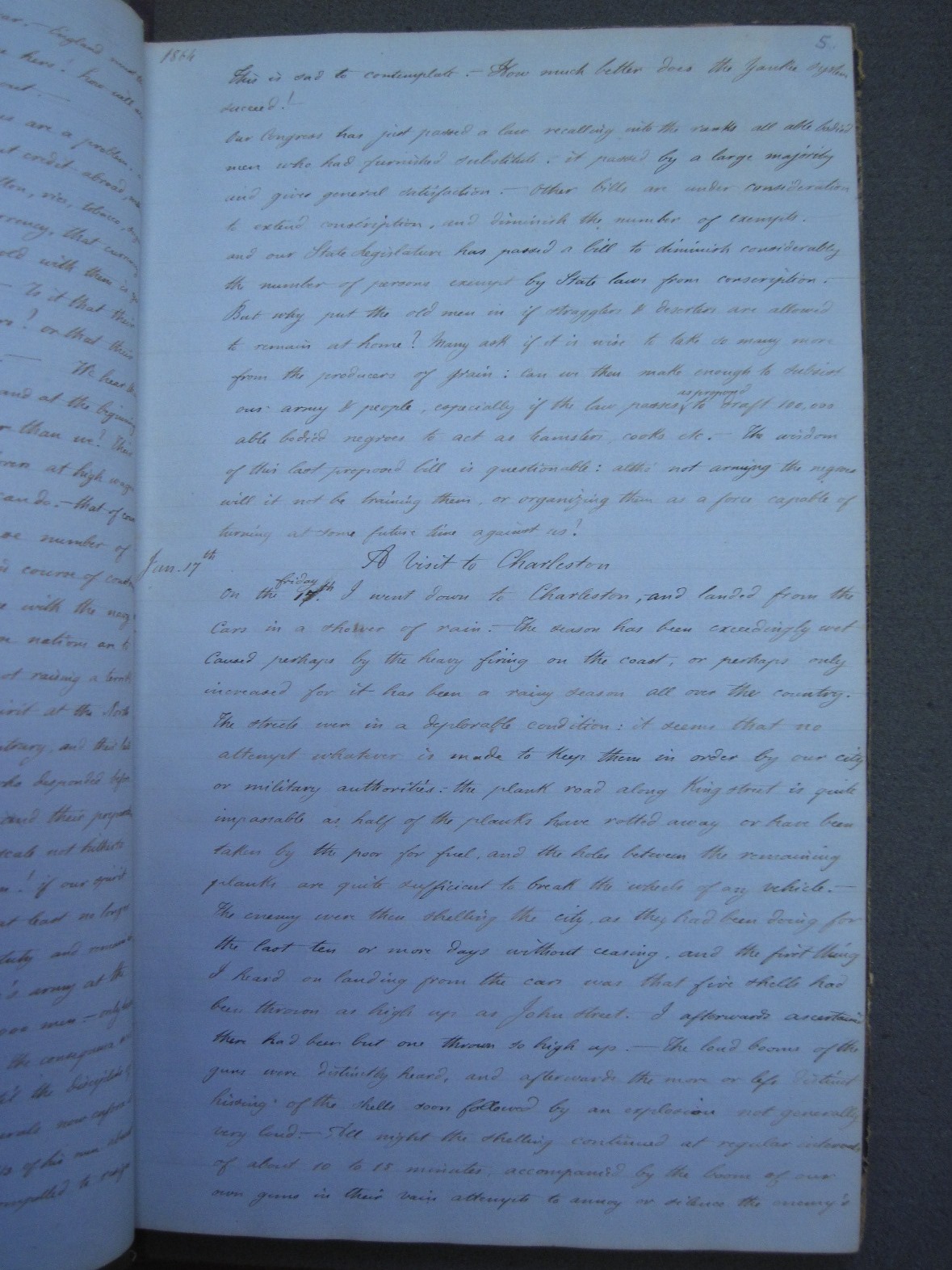Item description: Entry, 20 December 1863, from the diary of James Achille de Caradeuc with reflections on war news and current events.
Item transcription:
The War
The Situation
Dec. 20th. 1863.
After Bragg’s defeat at Missionary Hill near Chattanooga our army retreated in good order to []. Grant attempted a pursuit but Gen. Cleburne who commanded our rear, turned upon his vanguard defeating it completely thereby stopping the pursuit. Grant then retreated back to Chattanooga, he sent reinforcements to Burnside who was besieged at Knoxville by Longstreet, & thus compelled the latter to raise the seige after an unsuccessful assault. Grant hoped & tried to intercept and capture him & Gen. Wheeler, but without success. Bragg was wrong to send Longstreet to take Knoxville; his intention was no doubt to beat or capture Burnside, & thus place Grant’s army between himself and Longstreet & thus compel him to a hasty retreat or a battle at great disadvantage, but he weakened himself too much while Grant received heavy reinforcements and was enabled by vastly superior numbers to wrest Lookout Mountain and Missionary hill from us, and disable us from giving timely assistance to Longstreet. Bragg weakened himself by subdivision, while Grant concentrated his forces. We have thus lost the much prized Eastern Tennessee. At the present moment Longstreet is at Bristol, Wheeler is not far from him. Grant it is said has left only 20,000 at Chattanooga while the balance of his army has fallen back, perhaps to winter nearer his supplies, or to strike some where else.
Bragg by his own request has been superseded by Hardee, he was not a popular general. Our army is quiet at or near Ringold in Georgia. It is not certain that it has been reinforced.
In Virginia all is pretty quiet, and the two opposing armies seem to have gone into winter quarters; Meade’s army at & around Culpepper, ours facing it.
From the West of the Mississippi we hear very little. Gen. Taylor has several times defeated the Yankees, but Banks has taken Brownsville opposite Matamoros; this was a great blockade running place. Gen. Price does little or nothing. It is said some of our generals have again erected batteries on the Mississippi which prevent its navigation except for Gun boats.
The 164th. Day of the Seige
A few shells are daily and nightly thrown into the City from Morris Island, doing very little damage, and never setting fire notwithstanding all the Yankee boasts of their “fearfull Greek fire.” As soon as they commence shelling the City, our batteries on James and Sullivan islands fire upon the shelling batteries and soon drive the men to their “rat holes.” The Yankees are still fortifying Morris island and seem to be erecting new batteries. They have stopt firing upon fort Sumter as they have found out that their heaviest shells or shots now make no impression upon the powdered bricks & mortar which have fallen & formed a solid rampart. A fire happened last week into the fort by the explosion it is said of some of our “Greek fire,” twelve men were killed & over forty wounded, it was a fearful accident. All the business establishments of the City have been removed to the upper wards where the shells have not yet reached, and probably cannot reach. The Vandals are evidently practising at our beautiful St. Michael’s Steeple, as several buildings around it have been struck. The Charleston hotel, Mills house & other have closed. No blockade runners have lately come into our harbour as they probably cannot pass the Morris island batteries. From Northern accounts we learn that one of their finest monitors the Weehausen was sunk at our bar in a gale not long since, and nearly all her crew perished. The Ironsides has not fired a Gun or moved from her place since the torpedo affair, and it is thought she was very seriously injured.
At Wilmington the blockade running trade is still flourishing and steamers run in and out constantly. Each steamer carrying the fourth of her cargo for Government both in and out. Immense profits are realized to the fortunate ones, and companies are paying fabulous dividends.
Our finances are occasioning serious fears to every body, and previous to the meeting of Congress many letters were written by prominent men in the country proposing plans to improve their condition, and the officers of many of the Banks at the South had a Convention at Augusta to offer some plan for the action of Congress. The cause of the fearful depreciation in our Confederate money is by all attributed to the enormous amt. of paper money, some 800,000,000, while 200 millions is thought to be sufficient for the Currency of the Country.
Heavy taxes are proposed by some: forced loans by others. Congress has not yet come to any decision. From the variety of conflicting opinions expressed by able financiers, I feel confident that no remedy can be brought to the evil, and that Confederate paper money will continue to dwindle in value until they die out entirely. Thus it was with the French assignats: but the French had gold & silver to fall back upon, & immense national domains seized from Emigrants the sales of which were a great source of income. We have no silver & gold, and by numerous causes our cotton becomes each day less and less. Heavy taxation is all the resource we have and when the superabundance of paper has been withdrawn, how will these taxes be paid? Let abler heads decide! Meanwhile confidence is lost in the Govt. notes, and shaken in the security of the Bonds. Prices are increasing fearfully and those who have but a limited income are suffering much. Corn is now selling at $5 per bushel. Flour from $90 to $125. Shoes from $40 to 80. homespun at $3.50 to 4, most common half woollen goods $30 to $50. Yarn $35 per package of 5 lbs, beef fresh 65 in the country: 75 cts. in Aiken, $1. in town. Turkey $15 per pair, butter & lard $4 per lb. imported Calico $6. at Bee’s sales, 8 & 10 at Augusta, leather $6 to 8 per lb. fresh pork net $1. gross 80 cts. Cotton 75 to 85 cts.
None of the European nations have yet recognized our existence. The English Govt. still acting with characteristic perfidy have stopt the sailing of some powerful rams that had been built for us, while on the other hand they sell us some smaller vessels for the destruction of Yankee commerce; and allow the Yankees to recruit in Ireland and to ship cargoes of guns & ammunition for those recruits.
The French Gover’t allways so favorable to us have also suddenly ordered the detention of several steam frigates in course of construction for us, in some of their ports. Thus we can say that in our fearful struggle for existence we are without a friend, while our enemy have been favored in every possible way. Perhaps however, in the case of France, the unfortunate revolution of Poland may have compelled Louis Napoleon to postpone what action he might have intended in our favor, for war with Russia now seems imminent: we could not help him while the numerous Yankee fleet might give him trouble in Mexico or on the sea. England will remain neutral, for India is not threatened this time. The French go to war to help the oppressed! England never. But England is getting drained of specie. She buys cotton from India who wants specie for it, and not goods, as the Southern States did before the war. England must then requite specie also from the U. States to replace hers! how will all this net work be unravelled? how will it turn out.
In the mean time the Finances of the Yankees are a problem, a mystery to us all. How is it that without credit abroad, without the control of the great exporting articles, cotton, rice, tobacco, sugar, and with an enormous amt. of paper currency, that currency has not depreciated as much as ours? for gold with them is yet only $1.50 for 1. with us it is $20 for 1. Is it that their finances are so much better managed than ours? or that their people are more patriotic, no not the latter. We hear that the greatest prosperity exists at the North, and at the beginning of this war we thought they would suffer more than we? Their inumerable work shops are filled with laborers of course helps to keep up the war spirit. An immense number of most formidable iron clad war vessels are in course of construction, such a navy it is said as will be able to cope with the navy of France & England combined. How blind those nations are to wish, or to allow us to be crushed! are they not raising a terrible rival at the expense of a friend! The war spirit at the North is certainly not subsiding, indeed it is the contrary, and their late successes have given it a new impulse, and those who desponded before are now confident we will soon be subdued. Their preparations for the next spring campaign are upon a scale not hitherto equalled. And what have we to oppose them! If our spirit be not broken the enthusiasm of the people at least no longer exists, and all are now anxious to “shirk off” duty and remain at home to make money. 60,000 absent from Bragg’s army at the battle of Missionary hill in an army of 100,000 men, only 40,000 left to fight where we should have had 100,000. The consequence was defeat. And this will always be the case until the discipline of a regular army is enforced. Can our generals now enforce it? Bragg, the most rigid disciplinarian we have, had 2/3 of his men absent at a most important time, and was moreover compelled to resign. This is sad to contemplate. How much better does the Yankee system succeed!
Our Congress has just passed a law recalling into the ranks all able bodied men who had furnished substitute, it passed by a large majority, and gives general satisfaction. Other bills are under consideration to extend conscription, and diminish the number of exempts, and our State Legislature has passed a bill to diminish considerably the number of persons exempt by State laws from conscription. But why put the old men in if stragglers and deserters are allowed to remain at home? Many ask if it is wise to take so many more from the producers of grain. Can we then make enough to subsist our army & people, especially if the law passes, as proposed to draft 100,000 able bodied negroes to act as teamsters, cooks, etc. The wisdom of this last proposed bill is questionable, although not arming the negroes will it not be training them, or organizing them as a force capable of turning at some future time against us?






